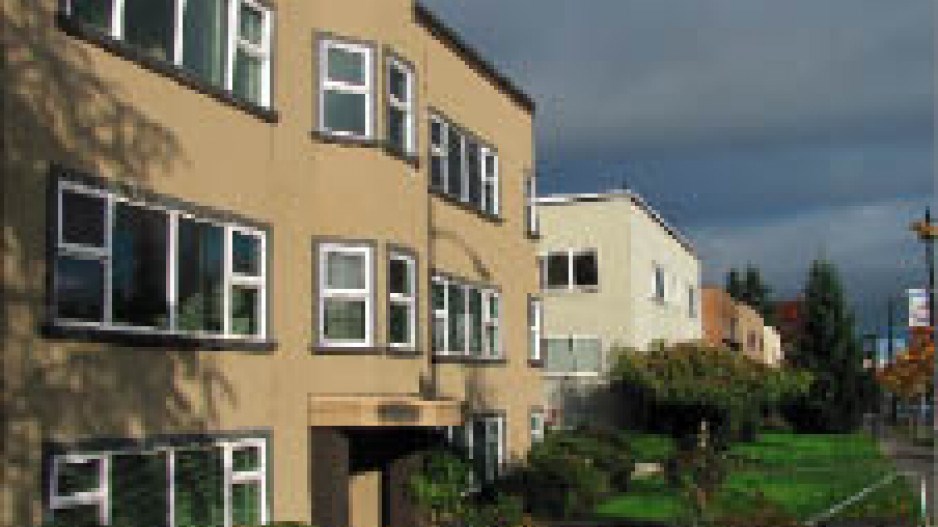Going national
Rental apartments may be a challenge to build in Vancouver, but this isn?t the only city grappling with the issue. During interviews for last week?s Business in Vancouver Full Disclosure feature story ?Apartment blocked? (issue 1150; November 8-14), apartment broker David Goodman observed that building purpose-built rentals is a challenge right across Canada – save for perhaps a few sites in Ontario.
The national need for affordable rental housing – not just condos or infill coach houses – has now spawned the Canadian Rental Housing Coalition, whose founding members signed a charter in Vancouver last week calling on governments and the private sector to work together to address the issue. Signatories to the charter include Maureen Enser, executive director of the Urban Development Institute; Marg Gordon, executive director of the B.C. Apartment Owners and Managers Association; and M.J. Whitemarsh, CEO of the Canadian Home Builders? Association of BC.
While the coalition?s founding members hail solely from B.C., Vancouver Mayor Gregor Robertson signed the document as chairman of the Big City Mayors Caucus of the Federation of Canadian Municipalities, and the Right to Housing Coalition of Manitoba has also endorsed the coalition?s charter.
?We need to work collaboratively and cooperatively to solve this problem. Isolated efforts aren?t going to cut it,? said Enser, who co-chairs the coalition with New Westminster Mayor Wayne Wright.
The charter calls for, among other things, a ?National Economic Strategy? to foster rental housing, reinstatement of federal tax incentives to stimulate construction, which were eliminated in the 1970s and the release of government land for rental construction.
Enser said rental housing is an important economic issue, because it?s linked to questions of affordable housing and because construction means jobs. She believes the coalition will be more successful than two others she?s been involved with in her career because it has a broad base of support. The coalition became a national initiative following its organizers? June 22 presentation to the Canadian Housing & Renewal Association in Regina.
We?re No. 2
Vancouver is second to Toronto among Canadian cities and fifth in North America so far as its ranking among investors goes, according to the annual Emerging Trends in Real Estate report by PricewaterhouseCoopers for the Urban Land Institute.
But second place isn?t a bad thing, given the rest of the world. Speaking in Vancouver on November 3, report author Jonathan Miller observed that the U.S. isn?t going anywhere, and asked, rhetorically: ?Don?t you have to be concerned if Europe continues in its real problem phase??
You?ve got it good, Vancouver – and even if a slowdown in China cools the economy here, the local market will remain tight with few sites for development and the immovable constraints of mountains and sea.
?You?ve got very, very tight markets, and I think you should feel good about your prospects,? Miller said.
North Shore industrial real estate powers up
A constrained land supply and lack of new product mean times are good in Vancouver industrial markets – notwithstanding an ?uneasy balance? Avison Young notes between supply and demand, driven in part by circumstances on the world stage.
?Most occupiers of industrial real estate are keeping an eye on the situation in the United States and Europe along with local conditions while considering a purchase or lease of additional space,? remarked Avison Young associate Michael Farrell in a recent press release. ?The resulting mixture of positive and negative economic indicators has led to and will continue to drive the cautious optimism we are seeing.?
But if there?s cautious optimism in the region as a whole, the real winner appears to be in North Vancouver, where industrial sales are heading for the greatest volume since 2006. The number of deals has dropped, but investors are so keen to get what?s available that buyers are willing to pay healthy sums for a piece of the action.
?The prices are continually escalating, and there?s buyers continually buying,? said Matt Thomas, an associate who works the North Shore. Sale times have diminished to one month today from three to six months two years ago. Sale prices for strata have risen to $300 a square foot – ?unheard of in any other market.? This has prompted vendors to come to market, feeding demand just enough to keep it coming. ?




